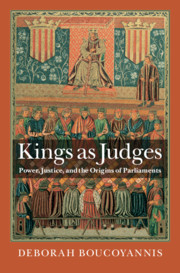Book contents
- Kings as Judges
- Kings as Judges
- Copyright page
- Contents
- Figures
- Tables
- Preface and Acknowledgments
- Part I The Origins of Representative Institutions: Power, Land, and Courts
- Part II The Origins of Representative Practice: Power, Obligation, and Taxation
- Part III Trade, Towns, and the Political Economy of Representation
- Part IV Land, Conditionality, and Property Rights
- 10 Power, Land, and Second-Best Constitutionalism: Central and Northern Europe
- 11 Conditional Land Law, Property Rights, and “Sultanism”: Premodern English and Ottoman Land Regimes
- 12 Land, Tenure, and Assemblies: Russia in the Sixteenth and Seventeenth Centuries
- Part V Why Representation in the West: Petitions, Collective Responsibility, and Supra-Local Organization
- Bibliography
- Index
11 - Conditional Land Law, Property Rights, and “Sultanism”: Premodern English and Ottoman Land Regimes
from Part IV - Land, Conditionality, and Property Rights
Published online by Cambridge University Press: 18 June 2021
- Kings as Judges
- Kings as Judges
- Copyright page
- Contents
- Figures
- Tables
- Preface and Acknowledgments
- Part I The Origins of Representative Institutions: Power, Land, and Courts
- Part II The Origins of Representative Practice: Power, Obligation, and Taxation
- Part III Trade, Towns, and the Political Economy of Representation
- Part IV Land, Conditionality, and Property Rights
- 10 Power, Land, and Second-Best Constitutionalism: Central and Northern Europe
- 11 Conditional Land Law, Property Rights, and “Sultanism”: Premodern English and Ottoman Land Regimes
- 12 Land, Tenure, and Assemblies: Russia in the Sixteenth and Seventeenth Centuries
- Part V Why Representation in the West: Petitions, Collective Responsibility, and Supra-Local Organization
- Bibliography
- Index
Summary
The question whether conditionality is sufficient for representation is answered in this chapter in the negative through the Ottoman case . The striking and unnoted similarities between the Ottoman land regime and that of England are examined here in detail. They show that a central feature of the Ottoman regime--that all land "belonged" to the sultan--has not received the appropriate comparative treatment. The chapter highlights the similarities between the understanding of private property and conditional state control of land in the Hanafi and Ottoman legal systems and that of England. It contrasts the western patrimonial concept of a fief to that of the Ottoman bureaucratic timar, to show that they are different types of rights. It analyzes the similarities in peasant rights over land. It also shows the strikingly similar responses to state control of land in the two systems, uses and vakifs, as well as the state responses to their expansion. The comparison shows that the two regimes do not differ so much in the type of property rights they secured--and certainly not in their absence in the Ottoman case--but in the capacity of the state to enforce them and to create centralized institutions that regulated them.
Keywords
- Type
- Chapter
- Information
- Kings as JudgesPower, Justice, and the Origins of Parliaments, pp. 231 - 251Publisher: Cambridge University PressPrint publication year: 2021

